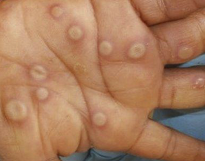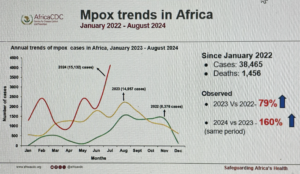WHO declares new mpox emergency (clade 1b): tecovirimat not effective in DRC study
16 August 2024. Related: mpox.
On 14 August 2024, WHO declared mpox a health emergency of international concern due to the rising cases of clade 1b reported in Democratic Republic of Congo (DRC) and neighbouring countries. [1]
But the number of cases in countries where mpox was traditionally reported as endemic continued to remain high throughout 2023 and 2024, long after the dramatic drop in cases in high-income countries and a similar drop in interest from Western media.
 The 2022 global outbreak, with the less virulent clade 2 strain was mainly reported in bisexual and gay men from May/June to December, with more than 90,000 cases reported in almost 100 countries, and with about 450 deaths.
The 2022 global outbreak, with the less virulent clade 2 strain was mainly reported in bisexual and gay men from May/June to December, with more than 90,000 cases reported in almost 100 countries, and with about 450 deaths.
The new WHO announcement is also driven by the DRC outbreak involving a more serious strain of mpox (clade 1b) and reports of more than 100 cases in four neighbouring African countries. More details of the DRC outbreak were presented at a webinar by WHO Africa a week earlier, including the upcoming emergency announcement. [2]
Since January 2022, an estimated 38,465 cases were reported in Africa with 1,456 deaths. Cases incresed by 79% in 2023 compared to 2022 and by 160% in 2024 compared to the same period in 2023. This included 15,132 cases reported from January to July 2024, with 461 deaths. In the previous week, 887 cases were reported with 5 deaths.
Cases increased by 79% in 2023 compared to 2022 and by 160% in 2024 compared to the same period in 2023. This included 15,132 cases reported from January to July 2024, with 461 deaths in ten countries, the vast majority in DRC. [3]
In the previous week, 887 cases were reported with 5 deaths. These estimates were based on accurate testing only being available for roughly 12–21% of samples.
This meeting included numerous references to the urgency of increasing access to better ways to test for and treat mpox and for vaccines to prevent it. This included a call for immediate access to 200,000 vaccine doses, increasing to millions of doses in subsequent years, but without explaining why 50,000 doses currently in DRC have still not been used.
The European Commission has already responded by coordinating to donate 215,00 doses of the MVA-BN vaccine, although this vaccine is ony currently registered in two African countries. [4]
The US NIH also reported the disappointing news this week that tecovirimat was not effective in treating clade 1 mpox in the DRC. [5]
The PALM007 study randomised 597 participants hospitalised for two weeks at two sites in DRC to either tecovirimat or placebo. No differences in outcomes were seen between the two groups, although no further details are included in the press release.
A slightly more optimistic press release from the manufacturer of tecovirimat claimed that benefits were seen when treated earlier and in more severe infections. [6]
comment
Further mpox outbreaks were always expected from global health experts because of the lack of resources provided to endemic countries during the 2022 outbreak.
One case of clade 1b has also been reported in Sweden, linked to travel to central Africa. Swedish state epidemiologist Magnus Gisslen (also a leading HIV doctor and researcher) explained that such cases, when managed promptly and carefully, will not affect the risk to the general population. [7]
This is important. The WHO announcements should not lead people to panic to be revaccinated in Western countries. The urgency for limited vaccine stocks will be in DRC and neighbouring countries.
However, cases of clade 2 mpox associated with the 2022 outbreak are still being reported, al-be-it in very low numbers. Where mpox vaccine programmes are still running, including in the UK, having the full two-shot course is still recommended in people at high risk. The time between vaccine shots will not reduce the efficacy of the second dose.
US activist group TAG highlights the need to overcome global health inequalities in order to effectively manage this and other health crises. [8]
i-Base has also updated an online refresher Q&A on mpox. [9]
References
- WHO. WHO Director-General declares mpox outbreak a public health emergency of international concern. (14 August 2024)
https://www.who.int/news/item/14-08-2024-who-director-general-declares-mpox-outbreak-a-public-health-emergency-of-international-concern - WHO Africa. Webinar and webcast on 2024 mpox crisis in DRC. (12 August 2024).
-
Burundi (8 cases; 0 deaths), Cameroon (35; 2), CAR (213; 0), Congo (146; 1), DRC (13,791; 450), Ghana (4; 0), Liberia (5; 0), Nigeria (24; 0), Rwanda (2; 0) and South Africa (22; 3).
-
European Commission press release. European Commission coordinates procurement and donation of 215000 vaccine doses from Bavarian Nordic to support Africa CDC in addressing the Mpox outbreak in affected countries in Africa. (14 August 2024).
- US NIH press release. The antiviral tecovirimat is safe but did not improve clade I mpox resolution in Democratic Republic of the Congo, (15 August 2024).
https://www.nih.gov/news-events/news-releases/antiviral-tecovirimat-safe-did-not-improve-clade-i-mpox-resolution-democratic-republic-congo - Siga press release. Topline Results from PALM 007 Study of SIGA’s Tecovirimat in Treatment of Mpox Released. (Undated)
https://s204.q4cdn.com/957130458/files/doc_news/2024/08/08-15-2024_SIGA_PALM-007-Press-Release_FINAL-FINAL.pdf - l Jazeera. Sweden confirms first case of mpox strain outside Africa. 15 August 2024).
https://www.aljazeera.com/news/2024/8/15/sweden-confirms-first-case-of-mpox-strain-outside-africa -
TAG. Treatment Action Group Calls for Coordinated Fully Funded Global Response to Mpox Emergency. (14 August 2024).
- i-Base. Mpox Q&A factsheet. (last updated 16 August 2024).
https://i-base.info/mpox/


